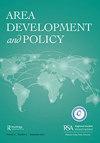The political rationality of state capitalism in Tanzania: Territorial transformation and the entrepreneurial individual
IF 1.8
Q3 DEVELOPMENT STUDIES
引用次数: 7
Abstract
ABSTRACT States have become active participants in markets in the past decade, precipitating renewed scholarly interest in state capitalism. We contribute to the conceptualization of contemporary state capitalism by bridging it with scholarship on infrastructure-led development and analysing its political rationality. We begin by introducing mid-20th-century high modernism, which coupled spatial planning and social engineering for the purpose of transforming territory and ‘improving’ populations. Through a comparative historical analysis of development regimes in Tanzania, we demonstrate that contemporary state capitalism tends to decouple these objectives; while there is an emphasis on the transformation of territory, social engineering is virtually absent. Instead, individuals are meant to recognize economic opportunity afforded by infrastructure projects and self-actualize accordingly. Our analysis shows that the political rationality of contemporary state capitalism in Tanzania combines high-modernist spatial planning with orthodox neoliberal assumptions surrounding the inherent entrepreneurialism of individuals.坦桑尼亚国家资本主义的政治理性:领土转型与企业家个体
在过去的十年中,国家已经成为市场的积极参与者,促使学术界重新对国家资本主义产生兴趣。我们通过将其与基础设施主导发展的学术联系起来,并分析其政治合理性,为当代国家资本主义的概念化做出了贡献。我们首先介绍了20世纪中期的高度现代主义,它结合了空间规划和社会工程,以改变领土和“改善”人口。通过对坦桑尼亚发展制度的比较历史分析,我们证明当代国家资本主义倾向于使这些目标脱钩;虽然强调了领土的转变,但社会工程实际上是缺席的。相反,个人应该认识到基础设施项目提供的经济机会,并相应地实现自我实现。我们的分析表明,坦桑尼亚当代国家资本主义的政治合理性将高度现代主义的空间规划与围绕个人内在创业精神的正统新自由主义假设结合起来。
本文章由计算机程序翻译,如有差异,请以英文原文为准。
求助全文
约1分钟内获得全文
求助全文

 求助内容:
求助内容: 应助结果提醒方式:
应助结果提醒方式:


